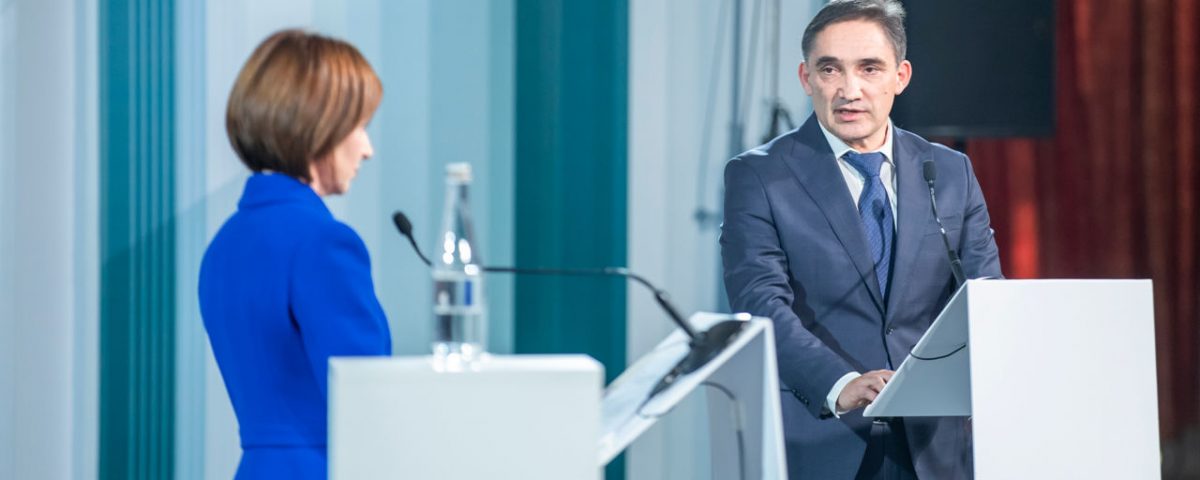Two recent significant political events in Moldova have determined its clear commitment to European integration. The first was the nationwide constitutional referendum held on October 20, 2024, which proposed an amendment to the Constitution of Moldova to affirm the citizens’ aspiration for European Union membership. The amendment solidifies Moldova’s choice for European integration and establishes EU membership as a constitutional priority for current and future governments. According to the Central Electoral Committee of Moldova (CEC), the referendum passed by a narrow margin, with 50.35% voting in favor of the amendment and 49.65% voting against it, marking a decisive point in Moldova’s political trajectory (CEC, 2024).
The second event was the regular presidential election, with the first round held on the same day as the referendum, October 20, 2024. Since none of the eleven running candidates secured a majority of the votes cast in the first round, the second round of the election was held on November 3. The outcome of the election reaffirmed the Moldovan people’s preference for European integration, as they decisively re-elected the incumbent candidate, Maia Sandu, with 55.35% of the votes, compared to her main opponent, Alexandr Stoianoglo from the Party of Socialists of the Republic of Moldova (PSRM), who received 44.65%. The rest of the candidates (Renato Usatîi, Irina Vlah, Victoria Furtună, Vasile Tarlev, Ion Chicu, Octavian Țîcu, Andrei Năstase, Natalia Morari and Tudor Ulianovschi) received considerably less number of votes than the two leading candidates and therefore did not make it to the second round.
Table 1. Results of the 2nd round of the presidential election in Moldova, 2024
| Maia Sandu | Alexandr Stoianoglo | ||
| Voter turnout | 54.34% | ||
| Party affiliation | Independent | Party of Socialists of the Republic of Moldova (PSRM) | |
| Stance on EU Integration | pro-European | Eurosceptic | |
| Total votes | 55.35% (930 238) | 44.65% (750 370) | |
| Domestic votes | 51.34% (694 422) | 48.66% (658 296) | |
| Overseas votes | 82.92% (271 843) | 17.08% (56 008) | |
Source: Central Electoral Committee of Moldova, 2024.
On the one hand, the 2024 presidential elections in Moldova shared many similarities with the previous elections in 2020 and 2016. While the candidates presented a range of electoral programs addressing various important domestic issues, foreign policy, particularly the question of whether Moldova should continue its pro-European trajectory, emerged as the most dominant issue. From the very beginning of the electoral process, this question overshadowed other topics and became the focal point of the election. In this sense, the electoral process was perceived by many voters as a continuation of the referendum.
Besides determining Moldova’s future trajectory regarding European integration, both the referendum and the presidential elections highlighted several important processes that will continue to shape Moldovan society and may offer insights into other post-Soviet societies. First, the diaspora played a decisive role in determining the outcome of both the referendum and the presidential elections. Without the diaspora’s involvement, the outcomes of both would likely have been the opposite. For instance, diaspora votes accounted for 15.8% of the total votes in the referendum and 24.1% of the votes in favor of the amendment. Among Moldovan citizens living abroad, 76.8% voted overwhelmingly in favor of the amendment, while those residing permanently in Moldova voted against it, with 54.6% opposing the change. Thus, the overwhelming participation of Moldovans living abroad and their pro-European views have ultimately decided the final outcome of the referendum (CEC, 2024).
A similar voting pattern shaped the results of the presidential election, where 82.9% of the overseas votes were cast in favor of the incumbent pro-European candidate, Maia Sandu, decisively contributing to her re-election for another presidential term. Domestically, her support amounted to only 48.7% of the votes. Approximately 29.2% of the votes for Maia Sandu came from overseas polling stations, which allowed her to overcome the shortfall in domestic votes and ultimately secure her victory. It is noteworthy that almost one-fifth of the total votes in the election were cast from abroad (CEC, 2024), representing one of the highest shares of overseas votes in the world.
Moldova has one of the highest percentages of citizens living abroad, with the majority residing there as migrant workers. The exact number of Moldovan nationals living abroad is unknown; however, according to the Ministry of Foreign Affairs of Moldova (MFA, 2021), it is estimated that as many as 1.2 million Moldovans might live outside the country. This is a significant figure for a nation with a total population barely exceeding 3 million. The vast majority of Moldovans living abroad reside in EU countries. It is estimated that around one-quarter of Moldovans may hold Romanian passports, as Romania offers a facilitated scheme for Moldovan citizens to obtain citizenship (Balkan Insight, 2021). Romania’s full membership in the EU greatly facilitates the ability of Moldovans to work and reside in EU countries. The government of Moldova supports labor migration as it helps reduce social tensions within the country and contributes over $2 billion to the country’s GDP through remittances (World Bank data, 2024). The electoral results show that pro-European views are highly prevalent among migrant Moldovans, who overwhelmingly supported Maia Sandu in elections across nearly all overseas polling stations. There were only a few exceptions, such as Russia and Türkiye, where she did not secure a majority of the votes from the local Moldovan diaspora (CEC, 2024).
This stark difference between domestic and overseas votes was also evident in the previous presidential elections of 2020 and 2016. It clearly demonstrates the contrasting political views and electoral preferences of Moldovans living inside the country versus those residing abroad. Over time, these differences show no signs of diminishing. Moldova is one of the places where nostalgia for the Soviet past remains unusually persistent among the population, which is a fascinating phenomenon in itself. Research has shown that these nostalgic feelings about the Soviet era strongly influenced the electoral choices of Moldovans (Marandici, 2021). Interestingly, these subjective perceptions do not seem to fade rapidly over time and remain rather persistent. For instance, a 2013 Gallup poll revealed that 42% of Moldovans believed the dissolution of the USSR was harmful, while only 26% viewed it as beneficial (Gallup, 2013). Similarly, a 2017 Pew Research Center survey found that 70% of Moldovans considered the collapse of the Soviet Union in 1991 to be a bad thing for their country (Pew Research Center, 2017). These sentiments appear to convert directly into Eurosceptic electoral choices.
However, the share of people with firm Eurosceptic and anti-Western views in Moldovan society appears to be gradually melting due to natural demographic shifts. The electoral statistics from the presidential elections provide interesting insights into these slow but steady changes. The age structure of voters abroad versus those within the country shows a stark difference, with a significantly larger proportion of younger voters among those living abroad and a relatively higher presence of elderly voters within the country. For instance, Moldovan passport holders aged 26 to 35 made up 27.2% of voters abroad, compared to just 12.5% of voters within the country. Conversely, the largest age group voting domestically was people aged 56 to 65, who cast 21.2% of the domestic votes, while this same age group accounted for only 10.6% of the votes from abroad. Overall, the share of voters aged under 45 constituted more than two-thirds of the overseas votes, whereas domestically, this age group accounted for only 37.9% of the votes (CEC, 2024). These statistics highlight the demographic shifts contributing to the gradual decline in eurosceptic and anti-Western attitudes within Moldovan society. This difference apparently stems from the fact that most Moldovans move abroad in search of job opportunities, leading to an increased proportion of older and elderly people remaining in the country. Beyond this demographic shift, the correlation between age group sizes and electoral preferences highlights an intergenerational divide regarding Moldova’s European future. The generation raised during the Soviet era tends to view the Soviet past more positively and is generally more prone to Euroscepticism. In contrast, the younger generation of Moldovans, who lack personal experience of the Soviet Union, often exhibit pro-European political views and are less influenced by Soviet nostalgia. Consequently, we can expect that pro-European views among Moldovans will only become stronger in the future due to natural demographic processes.
Another major polarization revealed by the electoral data is the geographic divide in Moldova concerning the country’s choice of European integration. As in the previous presidential elections of 2020 and 2016, electoral preferences regarding European integration appear to be starkly divided across different regions of the country. Gagauzia represents the most extreme case, showcasing the strongest Eurosceptic views in Moldova, as reaffirmed by both the referendum and the presidential elections. In the referendum, 89.5% of voters in this small autonomous region rejected the constitutional amendment. Similarly, an astonishing 97% of the vote in Gagauzia went to the eurosceptic candidate Alexandr Stoianoglo (CEC, 2024). The Gagauz people have consistently opposed all pro-European initiatives from Chisinau while ardently supporting pro-Russian policies ever since the collapse of the Soviet Union and their incorporation into Moldova as an autonomous region. Moreover, Moldova’s closest political partner, Romania, is perceived as a threat by the Gagauz people. Chisinau’s efforts to establish closer ties with Romania often cause anxiety in the autonomous region. The reasons behind these political views can be largely attributed to the historical memory of the Gagauz people. However, this voting trend in Gagauzia has persisted regardless of actual socio-economic circumstances.
The referendum and the 2024 presidential election in Moldova have once again confirmed the country’s European trajectory of development. It can be said that the extremely strong influence of external voting and the politically active diaspora is a clear indicator that Moldova is already, to a large extent, de facto integrated into the EU. A significant portion of its voters now reside permanently in EU member states and base their electoral choices on their European context. On the other hand, these events have also revealed that internal polarizations regarding Moldova’s choice of a European future remain unresolved. Such stark contradictions in a small country like Moldova represent a serious factor of instability and national security risk. Any socio-economic crisis under these circumstances would only exacerbate these internal divisions. Consequently, one of the Moldovan government’s priority tasks in the near future should be to develop and implement policies aimed at reducing internal intergenerational, interregional, and other contradictions. At the same time, efforts should focus on ensuring that the socio-economic benefits of EU integration are distributed more evenly so that all segments of the population can experience tangible improvements in their quality of life.
References:
Balkan Insight (2021). A quarter of Moldovans now have Romanian passports. Retrieved from https://balkaninsight.com/2021/05/27/quarter-of-moldovans-now-have-romanian-passports/?utm_source=chatgpt.com. Accessed on 17.11.2024.
Central Electoral Committee of the Republic of Moldova (2024). Results of round II. Retrieved from https://pvt22024.cec.md/cec-presidential-results-tour2.html. Accessed on 15.11.2024.
Gallup (2013). Former Soviet countries see more harm from the breakup. Retrieved from https://news.gallup.com/poll/166538/former-soviet-countries-harm-breakup.aspx. Accessed on 15.11.2024.
Marandici, Ion (2021). Nostalgic Voting? Explaining the electoral support for the political left in Post-Soviet Moldova. Eurasian Geography and Economics, 63 (4): 514–542.
Ministry of Foreign Affairs of Moldova (2021). Data on the size of the Moldovan diaspora. Retrieved from https://mfa.gov.md/sites/default/files/propunerile_maeie_privind_constituirea_celor_191_de_sectii_de_votare.pdf. Accessed on 28.01.2022.
Pew Research Center (2017). In Russia, nostalgia for the Soviet Union and positive feelings about Stalin. Retrieved from https://www.pewresearch.org/short-reads/2017/06/29/in-russia-nostalgia-for-soviet-union-and-positive-feelings-about-stalin/?utm_source=chatgpt.com. Accessed on 15.11.2024.
World Bank data (2024). Personal remittances, received (current US$). Retrieved from https://data.worldbank.org/indicator/BX.TRF.PWKR.CD.DT?most_recent_value_desc=true. Accessed on 14.11.2024.
Note: The views expressed in this blog are the author’s own and do not necessarily reflect the Institute’s editorial policy.

